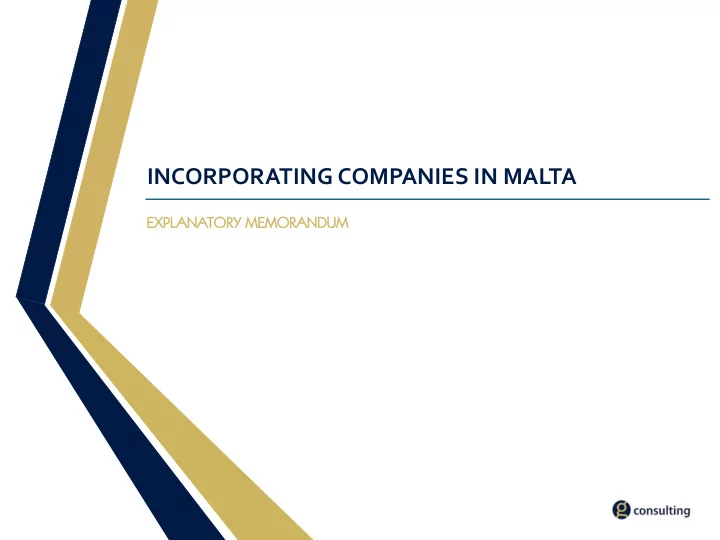

INCORPORATING COMPANIES IN MALTA EXPL EXPLANATORY Y MEMO MEMORANDUM
CONT ENTS Why Malta? ¤ Taxation of Companies ¤ System of Tax Refunds ¤ Other Tax Benefits ¤ Other Considerations ¤ G Consulting – Contact Info ¤
WHY MA LTA? Malta has been a member state of the European Union since 2004 with the Euro as its official • currency. • Both Maltese and English are official languages with the deeds constituting companies and partnerships being written in the English language. Companies and partnerships are based on the Companies Act and one can set-up the following • types of entities: Private limited liability companies; o Public companies; o Commercial partnerships; o Branches of foreign companies; and o European Economic Interest Groupings. o The most commonly used vehicle for doing business is the limited liability company. Malta’s company law is very similar to UK company law. Political and economic stability • Healthy banking system • Comprehensive set of laws including Trust law •
TAXATION OF COMPANIES When a company is set up in Malta, it is considered to be resident and domiciled in Malta for income tax purposes (subject to tax in Malta on a worldwide basis). In this respect it is of paramount importance that the effective management and control is exercised in Malta and that the company has a physical presence in Malta. Maltese companies are subject to income tax at 35% (no separate corporation tax system). The Maltese tax system adopts a full imputation system where shareholders receive a credit for the full tax paid by the company on profits distributed to them. The credit given may be utilised by the recipient of such a distribution to offset his income tax liability. Persons in receipt of dividends paid out of taxed profits do not suffer any further tax since the highest rate of tax in Malta for individuals is 35%, equal to the company tax rate. This implies that in Malta we do not have economic double taxation. Dividends paid out of untaxed profits to Maltese individuals and bodies of persons, excluding companies, suffer a withholding tax of 15%. Dividends paid out of untaxed profits to non-residents are not subject to any withholding tax.
SYSTEM OF TAX REFUNDS A non-resident person or a Maltese company owned by non-residents is entitled to claim a refund of tax paid by the company on dividends distributed. • As a general rule the refund amounts to 6/7 of the Malta tax paid. This would mean that the net effective tax paid in Malta would be reduced from 35% to 5%. The tax refund is reduced to 5/7 where the dividend is distributed out of passive interest or • royalties or if received from a participating holding which does not satisfy the anti-abuse provisions. Passive interest and royalties means interest or royalty income which is not derived directly or indirectly from a trade or business, where such interest or royalties have not suffered or suffered a foreign tax, directly, by way of withholding or otherwise, at a rate of tax which is less than 5%. When an enterprise has claimed treaty or unilateral relief then the tax refund will amount to 2/3 of • the Malta tax charge gross of relief (limited to the tax actually paid in Malta). If however the flat rate foreign tax credit is claimed, then the 2/3 refund is calculated on the actual tax paid.
OTHER TAX BENEFITS Malta’s tax legislation also provides for other tax benefits in the case of non–residents: Interest or royalties accruing to, or derived by, a non-resident beneficiary is exempt from tax, • provided that such interest or royalties are not effectively connected with a permanent establishment through which the non-resident carries on business in Malta. No tax on capital gains derived on the transfer of shares in Maltese companies held by non– • residents, provided that the Maltese company is not the owner of immovable property situated in Malta. Malta has an extensive double taxation treaty network making Malta a very attractive jurisdiction • for the setting up of holding companies. A part from double taxation agreements for the elimination or mitigation of juridical double taxation, Malta offers relief of double taxation on a unilateral basis as well. Tax advantages for companies owning vessels or intellectual property. Malta is also a hub for • banking, insurance and the gaming industry.
OTHER CONSIDERATIONS Va Value Adde Added Ta Tax (V (VAT): Since Malta is an EU member state, it operates a system of VAT, which is based on the EU directive for indirect taxation. Therefore, companies set up in Malta can obtain a VAT number which is EU identifiable; this makes it easier for such companies to trade within the European Union. Ed Education: Malta boasts a high level of education which means that the Country has a highly skilled work force that can help in the success of companies situated in Malta. Maltese companies can also freely employ individuals from with the EU.
G CONSULTING – CONTACT DETAILS G Consulting is working with one of Malta’s leading multi-disciplinary legal firms and a leading services firm to provide services to Companies wishing to Incorporate in Malta. For further information, please contact: Mr Mr. Pa Patrick Ga Gambin Managing Director Mobile:+971 50 556 5689 E-mail:patrick.gambin@gconsultingco.com
Recommend
More recommend